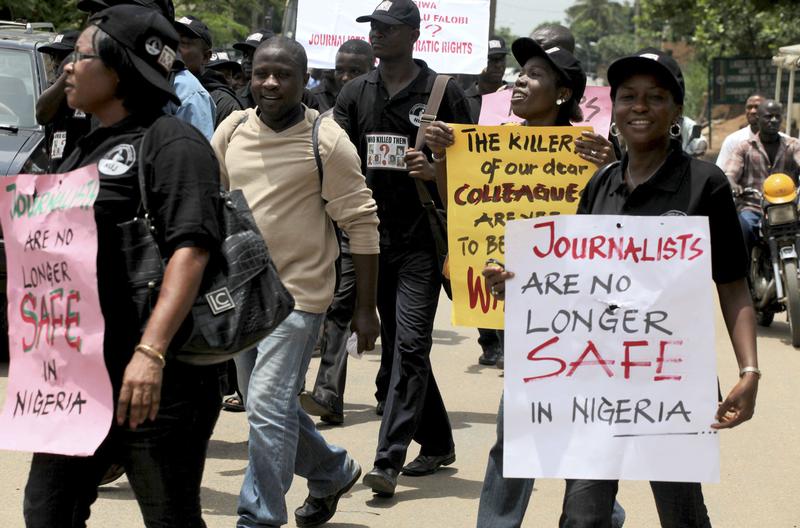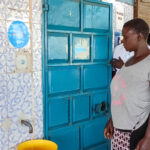On July 22 2019, a Nigerian journalist, Precious Owolabi, was reported to have been killed while covering a demonstration carried out by the Islamic Shiite in Abuja.
Before his death, 23-year-old Owolabi was an NYSC intern with Channels TV. Unfortunately, he was shot during the clash between the Islamic group and the Nigerian Police Force.
When this happened, The Federal Capital Territory Council of the Nigeria Union of Journalists recognised Owolabi’s death as another yet sad day for Journalism. But it was not to be the last.
In October 2020, while the Lagos State Task Force of the Nigerian Police Force was reported to have fired bullets during one of the #EndSARS protests, Pelumi Onifade was among the victims of the shootings.
The 20-year-old journalist was a 200-level student of the Department of History at the Tai Solarin University of Education, Ijagun, in Nigeria’s Ogun State. He was then an intern with Gboah TV, an online television.
Onifade was said to have joined one of his colleagues to cover an attempted burglary by hoodlums at a government facility at Abattoir, Oko Oba area of Agege in Southwest Nigeria, only for him to meet his dead.
Owolabi and Onifade are among the number of pressmen who have died on duty in Nigeria, Africa’s largest democracy.
Attacks on journalists are not just a Nigerian problem. In 2021, the International Press Institute or IPC reported that 45 journalists were killed in connection with their work that year alone.
Among the 45 journalists, 40 were male, and five were female. The research further revealed that 28 of them were targeted due to their work, three were killed while covering conflict, two lost their lives covering civil unrest, one was killed in the course of an assignment, and the other eleven cases are still under investigation as of then.
It gets worse. Over 1,600 journalists have been killed between 2006 and 2023. However, almost 9 out of 10 cases of these killings go unresolved judicially, according to UNESCO.
The assassination of two French journalists in Mali on 2nd November 2013 led to the proclamation of 2nd November as the International Day to End Impunity for Crimes against Journalists by the United Nations General Assembly.
While UNESCO is concerned about the impunity damages, it’s now utilising the commemoration of the day in calling out governments, civil society organisations, the media, and everyone concerned to join in the global efforts to end impunity.
Calling for the protection of journalists
A Nigerian media expert, Abdulwaheed Olayinka Adubi, acknowledged that assassinations of journalists in Nigeria and other parts of the world are common and as old as humans.
“Every day, we hear that one or two journalists are being assassinated. There is no clear cause for these crimes, but one can agree that a factor contributing to the assassination of journalists worldwide is insecurity,” said Adubi.
Adubi also noted that the nature of the journalism profession, which involves uncovering hidden information, is another factor.
“We are seen as individuals who aim to reveal the shortcomings of the public, affecting not only the private sector but also the government,” Adubi admitted.
Engaging in such tasks exposes journalists to danger, and Adubi shared that it makes them vulnerable to assassination due to the lack of necessary protection.
Adubi highlighted that when journalists are assassinated, it’s challenging for the government to apprehend the perpetrators and hold them accountable under the law.
“The government and particularly international media organisations, should ensure that strong laws are in place to address the assassinations of journalists. Media organisations have limited power to protect their journalists because they do not control the security apparatus in their localities, states, or countries. Therefore, it’s the government’s responsibility to protect journalists. Often, as journalists, we are exposed to danger, and this fear of being targeted by unknown individuals can hinder us from carrying out our work as expected,” Adubi explained.
He added that media organisations should train their journalists in safety measures.
“They should provide safety tips, instruct them on how to avoid danger and recognise risky areas, what to do and what not to do at specific times to ensure their safety,” Adubi said.
However, Adubi suggested that journalists can personally take steps to protect themselves while on duty by being security-conscious.
“They should know when to move, what to write, what not to write, understand the dynamics of their working environment, their role, the message they wish to convey to the public, and the potential implications of their actions,” he concluded.






